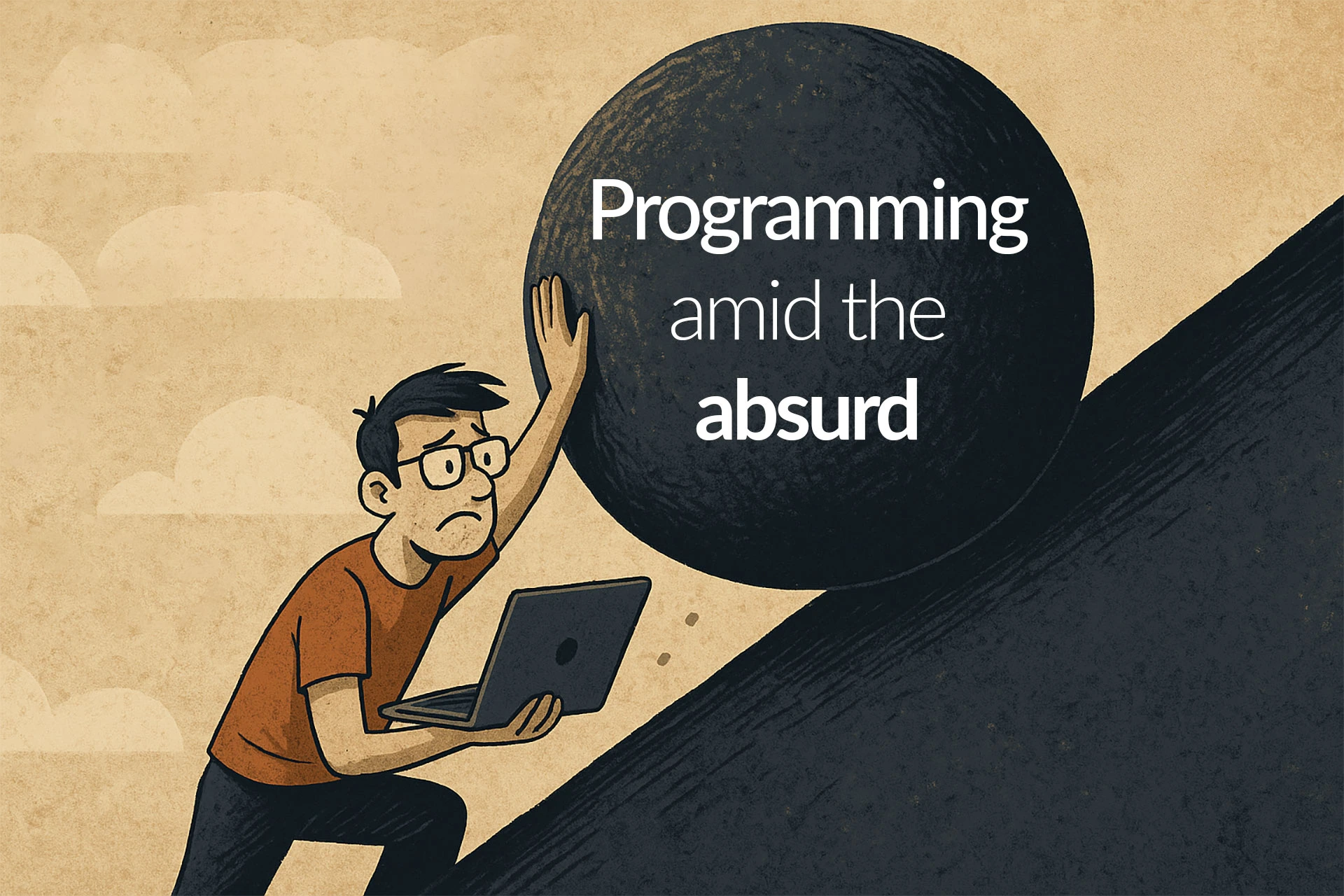The workday begins: you turn on your computer, check your to-do list. Oh, great. A bug… in production. But it worked yesterday. You rush to fix it—analyze, test, git push—everything passes. Perfect. You move on with your day like nothing happened.
A new day starts, you open your laptop, check your tasks… and oh, great again—a bug. In production. But it worked yesterday…
Do you know the myth of Sisyphus? For defying the gods, Zeus condemned him to roll a massive stone up a mountain, only for it to slip and roll back down each time he neared the top.
That’s basically the daily life of every developer, which makes me wonder: what’s the point of programming if we’re all just Sisyphus with keyboards?
Albert Camus saw in this myth a metaphor for the absurd human condition—our search for meaning collides with a chaotic and indifferent world, and yet we keep going, embracing the repetition with no promise of resolution.
Writing code is, in many ways, trying to impose logic on a chaos that doesn’t owe us any sense at all. And bugs are the perfect example: no matter how many you fix, another one always appears.
Programming lives in that cycle where, no matter how hard we try, we never really finish anything; like Sisyphus, the rock always rolls back down.
Take the cycle of maintenance and deployment: you push to production, everything looks great—until something breaks. You improve the infrastructure, then a traffic spike breaks it somewhere else. You fix a bottleneck, another appears. Even the daily stand-up reflects this repetition: same structure, different words, forever. No matter how far we advance, there’s always more to do—bug fixes, patches, new requirements, the next sprint.
Rick Cook put it best in The Wizardry Compiled:
“Programming today is a race between software engineers striving to build bigger and better idiot-proof programs, and the Universe trying to produce bigger and better idiots. So far, the Universe is winning.”
Studies show developers spend 35–50 % of their time debugging rather than building new features (Devon H. O’Dell, The Debugging Mindset). Fixing bugs often takes 30 times more effort than writing the original code (This Is What Your Developers Are Doing 75 % of the Time).
On average, developers introduce about 70 bugs per 1 000 lines of code, and spend nearly 75 % of their working hours—roughly 1 500 hours a year—debugging. Ironically, “if you thought your developers were spending their time building your dream, think again: most of the budget goes to finding and fixing defects.”
There’s even a term for bugs that vanish the moment you try to study them: the Heisenbug.Like a quantum effect, sometimes just logging or running code in debug mode changes the timing enough for the issue to disappear, mocking the very act of observation. Few things capture the weirdness of programming better than chasing a ghost bug that refuses to show itself. All that effort spent fighting entropy reinforces the sense that we’re trapped in an absurd loop—putting out fires instead of building something truly new.
Another face of the absurd in software development is how everything keeps changing—requirements, tools, entire ecosystems. You might pour days into a feature, only to find out the client changed direction or misunderstood the scope. Then comes the rewrite. Back to the start—again. (The Myth of Sisyphus, Failure, & the Meaning of Imperfect Code)
To make things more absurd, the tech industry evolves at breakneck speed, constantly creating new “must-learn” frameworks that promise to change your life—until the next one arrives. There’s even a phrase for this exhaustion: JavaScript Fatigue, coined around 2016 to describe the burnout many felt trying to keep up with endless new tools and frameworks (Dealing with JavaScript Fatigue).
It all leads to one truth: most of what we know today will be obsolete in two years. That’s the absurdity of programming—and, paradoxically, its only certainty: change.
The Sense of the Absurd
So why keep programming? Camus would say: don’t look for meaning—create it.
Despite the frustration, I wouldn’t trade this job for anything. Developing software may make us Sisyphus, but it also keeps us moving. Innovation, constant learning, and the hunger for understanding drive this profession.
Personally, I love that constant change. I enjoy stepping out of my comfort zone, surprising myself with technologies I once couldn’t grasp, seeing my own growth—the languages that once felt alien now feel like home.
And I’m far from alone. Most developers learn to love the process itself. Every bug fixed, every optimized function, every new skill mastered gives a spark of satisfaction that makes it all worth it. As one writer put it, “Coding isn’t different from Sisyphus pushing his rock uphill. There are obstacles, errors, failures—but I keep coding. I find joy in the challenge and the struggle.” Somehow, the frustration itself becomes meaningful—proof that we’re learning, improving, making some small difference through our imperfect code. Another developer summed it up perfectly: “Over the years, we find ourselves solving the same problems again and again—hopefully a bit better each time. We learn to enjoy the process. Don’t be ashamed of past work; just keep learning to be better. The rock may be at the bottom again tomorrow, but we’re not the same as yesterday.”
Conclusion — The Journey Is What Matters
To borrow a One Piece reference: “Programming is the friends we make along the way.” But seriously—programming is about enjoying the road: the small victories, the frustration when things break, and the satisfaction of finally figuring them out.
Camus taught us not to wait for meaning but to give it ourselves—to stop obsessing over where the path ends, and instead find peace in walking it. The destination doesn’t matter as much as what we learn and how much we enjoy getting there.
The rock always rolls back down, yes. But every time, we push it with a little more grace.
See you in the next post.
